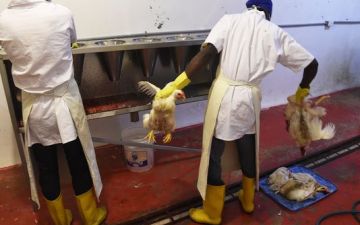Haiti once had a prospering chicken sector but steep tariff reductions, encouraged by the U.S. and international trade organizations, eroded the industry in the mid-1990s. Cheaper prices undercut the local market and put the leading production companies out of business.
Today, the country’s chicken imports, mostly supplied by the U.S., far outpace its own production, similar to other agricultural staples once thriving in Haiti. Meanwhile, many in rural areas lack access to income and adequate food.
Jamie McGee and Larry McCormack explore a poultry farming initiative developed in 2012 as a means to create sustainable jobs while addressing food insecurity. Farmers are offered loans, training and chicken coop equipment and they are able to develop an income stream as they pay off their loans.
The organization behind the initiative has created a processing plant to allow the operations to scale and better compete against the cheaper imports—building a livelihood for Haitian farmers and helping to grow a market that has struggled in past decades.



